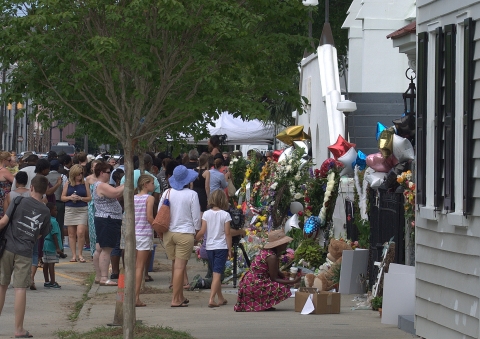
Flowers are placed outside Mother Emanuel AME Church in Charleston, S.C., where nine churchgoers were killed.
Standing in the Mother Emanuel African Methodist Church meeting room as the faithful filed in for the first service since last week’s massacre, it occurred to me that most of us can’t process true horror.
If we could, we could not have stayed there for Sunday’s service.
Better we had run screaming into the blistering, sun-baking Calhoun St. outside than walk on those bullet-chipped floor tiles.
If we could process what had been done in hate’s name in that most sacred and historic of places, we would collapse in pain, curl up in a ball, rip our clothes into rags even as we listened to Rev. Norvel Goff exhort the oft-times wailing congregation.
“When evil is in the world, you may not be able to control evildoers, but what I want you to know today is that I know a man who can handle all our problems,” Goff said.
My sister, Althea, is Emanuel’s secretary. Her office is right outside the late Rev. Clementa Pinckney’s.
Law enforcement officers have been closed-mouthed, but Charleston is a relatively small city of about 128,000. So just about every black person you meet here knew one of the nine victims or knows a relative of one of the dead.
Two of the survivors told their stories to friends, who shared tidbits like this: Pinckney’s wife, Jennifer, hid under a four-seat table in his office with one of their children. They were saved Wednesday only because Dylann Roof kicked the door so violently it got stuck.
It was still stuck Sunday.
The trail of bullet holes on the floors and walls tell another story: that the oldest man in the room gave Roof a run for his money.
My sister was 74-year-old Rev. Daniel Simmons’ secretary when he pastored a church in nearby Mount Pleasant, S.C. He retired from that church several years ago and joined Mother Emanuel. When the Mother Emanuel Church secretary retired, he recommended Althea for the job.
Simmons was alive when police found him lying on the floor beside the back door, which is directly across a narrow hallway from the door to my sister’s office. Follow the bullet holes and it is clear that Roof shot at him several times as Simmons ran from the table, around a corner and to the door.
Police had insisted on cleaning the entire sanctuary before letting the congregants in. Veteran officers said the carnage was too terrible to describe.
But the Mother Emanuel meeting room is a large space. Even the most diligent of workers were bound to miss something, and the reporter in me, wanting evidence, looked for it.
On Sunday morning, I spotted two small splotches of blood on the floor plate of my sister’s office door and unthinkingly pointed them out to her.
Then I held Althea as she cried, and cried and cried.
Main image CC-licensed by Flickr via jalexartis.